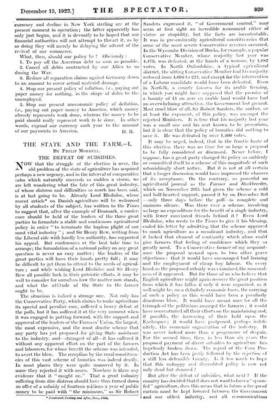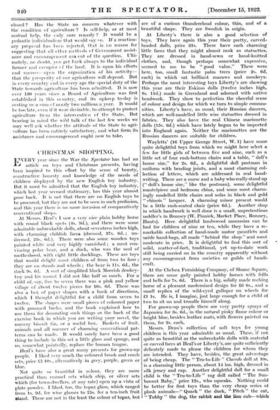THE STATE AND THE FARM.—I.
BY PHILIP MORRELL.
THE DEFEAT OF SUBSIDIES.
AT OW that the struggle of the election is over, the . old problem of the state of agriculture has acquired . perhaps a new urgency, and in the interval of comparative calm which naturally succeeds so sudden a storm, we are left wondering what the fate of this great industry, of whose distress and difficulties so much has been said, is at last going to be. Already Lord Bledisloe, whose recent article* on Danish agriculture will be welcomed by all students of the subject, has written to the Times to suggest that, after the example of Denmark, a confer- ence should be held of the leaders of the three great parties to formulate a stable and continuous agricultural policy in order " to terminate the hapless plight of our most vital industry " ; and Sir Henry Rew, writing from the Liberal side with hardly less authority, has supported his appeal. But conferences at the best take time to arrange; the formulation of a national policy on any great question is never an easy matter ; the leaders of the . great parties will have their hands pretty full ; it may be difficult to get them to attend to the needs of agricul- ture ; and while wishing Lord Bledisloe and Sir Henry Rew all possible luck in their patriotic efforts, it may be well to consider for ourselves how the matter now stands, and what the attitude of the State to the farmer ought to be.
The situation is indeed a strange one. Not only has the Conservative Party, which claims to make agriculture its special and peculiar care, suffered a heavy defeat at the polls, but it has suffered it at the very moment when it was engaged in putting forward, with the support and approval of the leaders of the Farmers' Union, the largest, the most expensive, and the most drastic scheme that any party has yet proposed for giving State assistance to the industry, and—strangest of all—it has suffered it without any apparent effort on the part of the farmers and labourers, for whose benefit the scheme was intended, to avert the blow. The reception by the rural constituen- cies of this vast scheme of bounties was indeed deadly. In most places they were quite unmoved by it. In some they rejected it with scorn. 'Nowhere is there any evidence that it " caught on." That a great industry suffering from dire distress should have thus turned down an offer of a subsidy of fourteen millions a year of public money to be paid with " the minimum," as Sir Robert • 1 inefeenik Cesium and After. Dec., 194, Sanders expressed it, " of Government control." may seem at first sight an incredible monument either of virtue or stupidity, but the facts arc incontestable.
It was in pre-eminently agricultural constituencies that sonic of the most severe Conservative reverses occurred.
In the Wycombe Division of Bucks, for example, a popular Conservative Member, whose majority last year was 4,473, was defeated, at the hands of a woman, by 1,682 votes. In North Oxfordshire, a typical agricultural district, the sitting Conservative Member had his majority reduced from 4,606 to 224. and except for the intervention of a Labour candidate would have been defeated. Even in Norfolk, a county famous for its arable farming, in which you might have supposed that the promise of a bounty of £1 an acre on arable land would have had an overwhelming attraction, the Government lost ground. Most cruel blow of all, Sir Robert Sanders, the author, or at least the exponent, of this policy, was amongst the rejected Ministers. It is true that his majority last year was a small one and his seat known to be precarious, but it is clear that the policy of bounties did nothing to save it. He was defeated by over 1,400 votes.
It may be urged, indeed, that in the frantic haste of this election there was no time for so large a proposal to be fully considered or discussed. Never befOre, I suppose, has a great party changed its policy so suddenly or committed itself to a scheme of this magnitude at such astonishingly short notice. But it is not at all certain that a longer discussion would have improved the chances of its acceptance. On the contrary, so powerful an agricultural journal as the Farmer and Stockbreeder, which on November 26th had given the scheme a cold and half-hearted support, passed it by on December 3rd —only three days before the poll—in complete and ominous silence. Was there ever a scheme, involving so large an expenditure for the benefit of a single industry, with fewer convinced friends behind it ? Even Lord Bledisloe, who wrote to the Times to give it his blessing, ended his letter by admitting that the scheme appeared to mark agriculture as a mendicant industry, and that it lacked that element of continuity which alone could give farmers that feeling of confidence which they so greatly need. To a Conservative farmer of my acquaint- ance the proposal seemed open to two other grave objections : that it would have encouraged bad farming and the employment of cheap boy labour. On every hand, as the proposed subsidy was examined, the unsound- ness of it appeared. But for those of us who believe that English agriculture might again recover the great position from which it has fallen if only it were organized, as it well alight be, on a definitely economic basis, the carrying of such a policy as this would have been a peculiarly disastrous blow. It would have meant once for all the triumph of the politicians amongst the farmers ; it would have concentrated all their efforts on the maintaining and, if possible, the increasing of their hold upon the Exchequer ; it would have postponed, perhaps indefi- nitely, the economic organization of the industry. It was never indeed more than a programme of despair. For the second time, then, in less than six years the proposed payment of direct subsidies to agriculture has; hopelessly broken down. The repeal of the Corn Pro- duction Act has been justly followed by the rejection of a still less defensible bounty. Is it too much to hope that this unhappy and discredited policy is now not only dead but damned ?
But after the defeat of subsidies, what next ? If the country has decided that it does not want to have a " spoon- fed" agriculture, does this mean that in future a fire-proof curtain must be kept lowered between the Government and our oldest industry, and all communications closed ? Has the State no concern whatever with the condition of agriculture ? Is self-help,- or at most mutual help, the only sure remedy ? It would be a pedantic individualism that would say E0. If a reaction- ary proposal has been rejected, that is no reason for suggesting that all other methods of Government assist- ance and encouragement ara out of the question. Ulti- mately, no doubt, Will get hack always to the individual fanner and occupier of the land. It is upon his efforts and success—upon the organization of his activity— that the prosperity of our agriculture will .depend. But in every country and in every age the special duty of the State towards agriculture has been admitted. It is now over 130 years since a Board of Agriculture was first established in this country, and its upkeep to-clay is costing us a sum of nearly two millions a year. It would be too late, even if it were desirable, to attempt to protect agriculture from the intervention of the State. But bearing in mind the wild talk cf the last few weeks we may well ask whether the attitude of the State to agri- culture has been entirely satisfactory, and what form its assistance and encouragement ought now to take.



















































 Previous page
Previous page